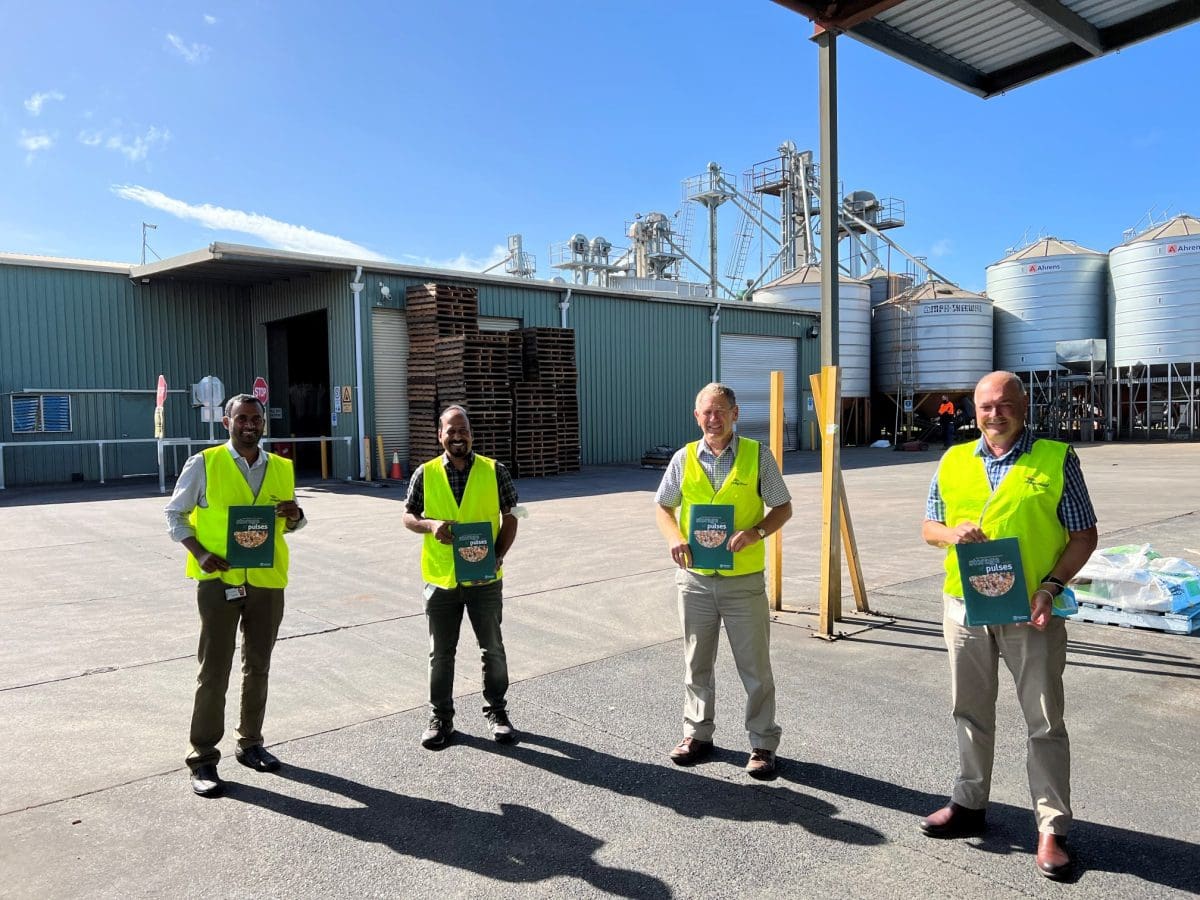
Queensland Department of Agriculture and Fisheries researchers Raj Jagadeesan, Manoj Nayak, Philip Burrill and Greg Daglish all worked on the pulse storage guide. Source: QDAF
QUEENSLAND researchers have developed a comprehensive guide for storing pulses and managing pests which will support the multi-million dollar chickpea and pulses industry.
Minister for Agricultural Industry Development and Fisheries Mark Furner said the guide would help growers maximise profitability and further strengthen Queensland’s reputation for supplying premium quality, pest-free pulses in a competitive international market.
“The Pulse Storage Best Management Practice Guide is the result of three years of research and collaboration by scientists from the Department of Agriculture and Fisheries with producers and industry partners, involving extensive field trials and laboratory testing, as well as an exhaustive review of published information,” Mr Furner said.
“Most pulses grown in Australia are exported, earning almost $2 billion annually, with Queensland’s chickpeas and mungbeans valued at around $264 million in 2020-21.
“Chickpeas and mungbeans are an essential food for millions of people globally, and Australia is known for having among the highest standards in the world for pulse exports.”
Mr Furner said the guide was created with growers and exporters in mind.
“Maintaining the highest quality and the best prices relies heavily on how pulses are stored after harvest,” he said.
“The new guide will be a key reference manual for pulse growers, exporters and other stakeholders, with a wealth of information about hygiene, aeration and fumigation for the storage of pulses.”
PB Agrifoods owner and managing director Peter Brodie said the guide is the result of collaboration between government and industry.
“This is a great example of government and industry working together to facilitate valuable research and publish information to help ensure the pulse industry continues to be able to export top quality produce to our customers worldwide,” Mr Brodie said.
Click here to view the guide.
Speaking at the launch, PB Agrifood field officer Ben McIntyre said the guide would be helpful to anyone looking to keep pests, and the bruchid beetle in particular, out of stored pulses.
“They’re a particularly aggressive insect and we’re seeing more and more of them down here in southern Queensland,” Mr McIntyre said.
“They used to be something that you’d only see in Central Queensland once, but they’re moving further south.
“We’ve got to keep an eye out for those things and make sure that we’re on top of them before they become a problem.
“Once you get an infestation, they’re very hard to shift.”
Early Queensland mungbeans crops are now only a couple of weeks away from harvest, and their value can drop from more than $1100 per tonne to around $250/t if they become infested with insects in storage.
“You don’t have to be Einstein to work out how quickly you can lose significant value out of a crop like that,” AgForce grains board president and Warra grower Brendan Taylor said.
“Managing insects from the farm-storage facilities right through to container packers here like PB Agrifood can be incredibly challenging and, particularly as mentioned in this book here, the bruchid insect.
“They can turn up out of the blue and can cause significant damage to stored grain, particularly the pulses.”
Mr McIntyre said good farming and storage practices had helped to keep the Australian industry on the front foot.
“The rest of the world is getting better at producing good product as well, so we have to continually keep raising the bar to make sure that our crops are saleable overseas and that we continue to be the preferred supplier to a lot of countries.”
Source: Queensland Department of Agriculture and Fisheries

HAVE YOUR SAY